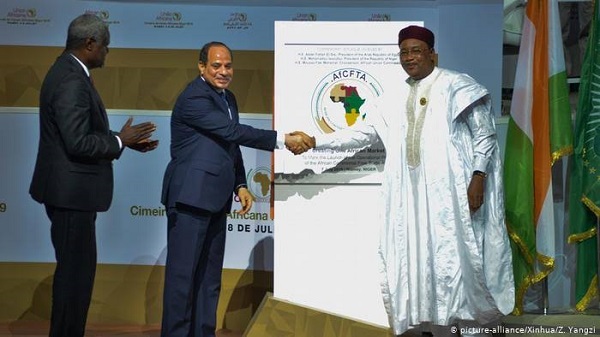
AfCTA: Nigeria Government outlines steps to be taken by businesses to export to member countries.
Nigeria’s government promote trade under AfCTA
Following the ratification of African Free Trade Agreement (AfCFTA) by member nations, the Federal Government has outline steps to be taken by Nigerian businesses to export to other member-countries of the AfCFTA.
The Acting Director-General/Chief Trade Negotiator, Victor Liman, made it known in a statement signed by him in a tweet via the official twitter handle of the Nigerian Office for Trade Negotiations (NOTN) @TradeOfficeNG on Tuesday.
This is a step in the right direction to guide and assist Nigerian exporters who wants to take advantage of this platform to export to other AfCFTA countries.
Steps to be taken by exporters outlined by NOTN:
Exporter or agent must secure all necessary licenses, permits, certificates and necessary documents from relevant agencies like Nigerian Export Promotion Council (NEPC), Standard Organization of Nigeria (SON), National Agency for Food and Drug Administration and Control (NAFDAC), Nigerian Agricultural Quarantine Service (NAQS) and others.
Ensure that the product qualifies for export under AfCFTA.
Create a bill of entry, attach all relevant permits from government agencies and secure reservation with shipping or airline company. Apply for Nigeria Customs Service AfCFTA Certificate of Origin after paying a fee.
The Nigerian Customs Service is the issuer of the certificate, however, NACCIMA must vet the application.
Also, other accompanying documents required for shipment under AfCFTA includes:
Certificate of origin
Nigerian Customs
Bill of Entry
Bill of Lading
Packing list and Certificate of Analysis.
Finally, compulsory AfCFTA trading documents:
Supplier/Producer’s declaration form
Origin of declaration form
AfCFTA Certificate of origin.
AfCTA Agreement
Recall that the Nigerian government ratified the agreement on 12 November 2020, ahead of the December 5 deadline issued by the African Union to its member states.
AfCFTA agreement will facilitate regional and continental value chain which will lead to more revenue generation through export earnings and also attract investors, enhance job creations and also has the potential to lift 30 million people out of poverty.
It has been projected that African single Continental market will boost the value of inter-Africa trade by about $35 billion annually by aggregating Africa’s vibrant market size of 1.2 billion people.
AfCTA would also harness and transform Africa’s enormous natural resources through manufacturing of value added products and increase Africa’s share of global trade.
Nigeria’s government promotion of trade under AfCTA
In order to tap into the AFCTA enormous benefits, the Nigerian government has rolled out strategic policies to ramp up manufacturing and services for increased exports to other AFCTA countries which form the basis of Nigeria’s national action strategy to boost intra-Africa trade and diversifying Nigeria’s export basket on line with Nigeria’s Trade and Foreign Policy objectives.
The Nigerian government has already commenced the implementation of strategic programmes and complementary initiatives such as:
N50billion Export Expansion Facility Programme (EEEP) and N2.3 Trillion National Economic Sustainability Plan for export driven economic growth (NESP);
$1 billion Nigeria-Africa Trade and Investment Programme (NATIPP) jointly launched by African Export-Import Bank (Afreximbank),Nigerian Export-Import Bank (NEXIM) and the Nigerian Export Promotion Council (NEPC);
NEPC Zero Oil Plan (ZOP) to promote non-oil exports;
Nigeria Industrial Revolution Plan (NIRP)for value addition in key priority sectors to build Nigeria’s competitive advantage , accelerate expansion of the manufacturing sector and broaden industry scope;
Anchor Borrowers’ Programme (ABP)launched by Central Bank of Nigeria to boost the production of agricultural commodities and value chain development;
One Product State Initiative of the National Committee on Export Promotion (NCEP);
Harnessing of every State’s competitive advantage and opportunities as contained in the Book of States through the Nigerian Investments Certification Programmes for States (NCIPS);
Nigeria e-Customs project for the fully integrated Customs Digitalisation to aid seamless administration, payment border management, export and import processing;
Port Digitalisation by the Nigeria’s Shippers Council;
National Economic Diversification Agenda;
National Policy on Micro, Small and medium Enterprises (MSMEs)
Worthy of note is the government’s priotilization, commitment and interventions for increasing the accessibility and availability of credit to Micro, Small and medium Enterprises (MSMEs) being the economy’s engine room and Harnessing Nigeria’s vibrant human resources to boost trade, financing and Investment.
All these and so much more are designed and intended to diversify and develop Nigeria’s economy and consolidate Nigeria’s position as Africa’s biggest economy and industrial hub.
The AfCFTA, if well implemented, would no doubt transform conflicts across the continent by reducing the incentives for participating in conflicts, via the creation of jobs. But first governments across Africa must be willing to exert the required leadership and political will to bring the AfCFTA to full effect through proper implementation.
 MMS PLUS NG – Maritime, Aviation, Business, Oil and Gas News Online Newspaper with coverage in Maritime, Oil and Gas, Aviation, Power and Energy as well as Financial News
MMS PLUS NG – Maritime, Aviation, Business, Oil and Gas News Online Newspaper with coverage in Maritime, Oil and Gas, Aviation, Power and Energy as well as Financial News









